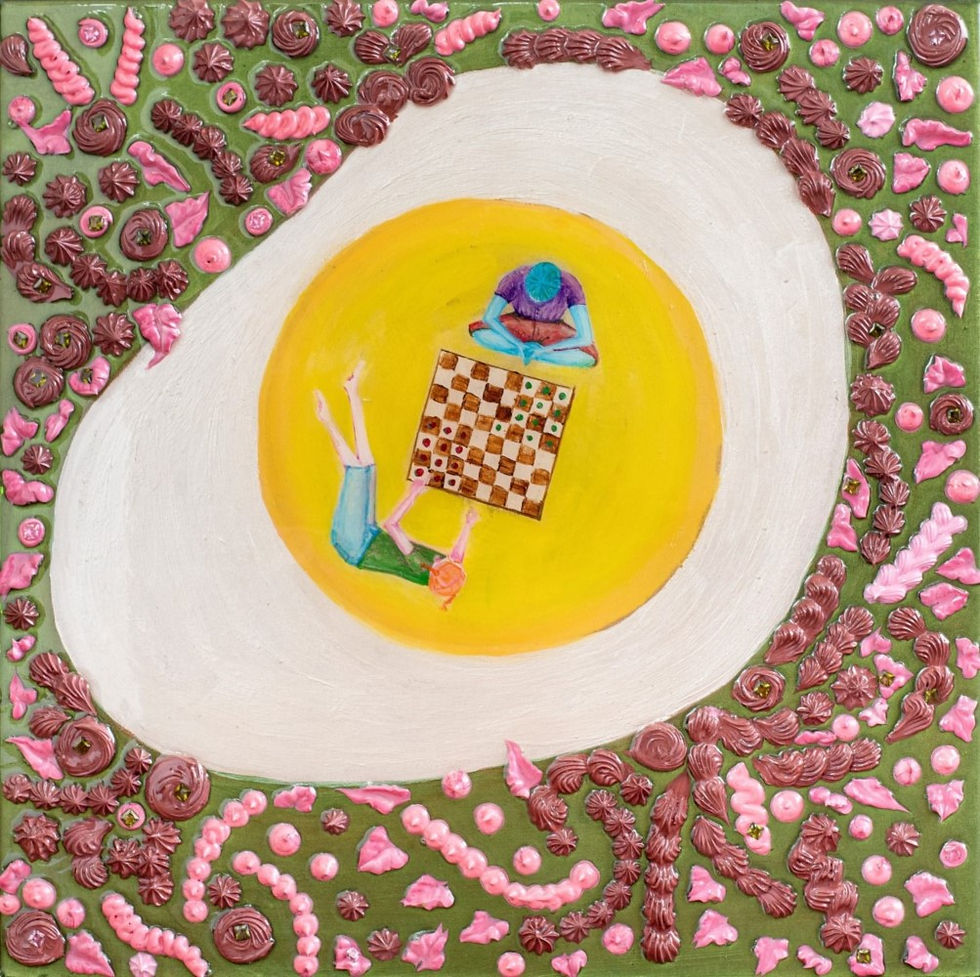Featured Artist of The Week: Nadine Micklewright!
- Kirstie Tebbs
- May 20, 2022
- 3 min read
Featured Artist of The Week: Nadine Micklewright!
"My work has a strong connection to modernism and post-modernist, identifying the
differences between artists of each movement and examining the different way in
which these artists convey their concept and their reactions to one another for
example Lichtenstein’s reaction to Kline’s modernist brushstroke and Frank
Auerbach’s modernist work and Glenn Brown’s post-modern reaction. This is what I
project into my diptychs by evoking the reaction of post-modernist painting to a
modernist one, much like how the artists I listed did to the modernist artist it
originated from.
My work reflects on quotes from critics such as Henry Moore and his opinions on the
truth to materials which is the notion of belief that the form of a work of art should be
inseparably related to the material in which it is made, in which my work is a reaction
to, for example to modernist piece I create first agrees with Moore perception of truth
to materials, however I then create a post-modernist piece which is the work which
reacts to the first piece, making fun of the first piece, a piece untrue to the materials
and a disagreement with Moore’s theory. The contemporary art and art history
context and influences in my work focus on the two movements I have mentioned,
also acknowledging their overlap in time. I have also been looking at the idea of
‘Post-Post-Modernism’ and the contemporary art scene of modern-day art."
Selected artwork:
Artworks in order:
‘Diptych 1’, September, acrylic paint mixed with sawdust, 2 x 59.4 x 84.1 cm,
£120 for both
This is the first piece which I have created since slightly changing the conceptual aspects of
my work. This piece shows a two pieces that appear identical – however this is untrue. The
piece on the left contains impasto paint created using sawdust, a textured surface, the
second piece is a post-modernist reaction to the modernist piece on the left; a piece flat to
the surface and copied using normal acrylic paint. This diptych is inspired by famous
modernist artists who approached their own work with new ideas then a few years later the
post-modernist artists for example Roy Lichtenstein and Glenn Brown created their own
work as a reaction to the original pieces made by the modernists.
‘Diptych 2’, October, acrylic paint mixed with sawdust, 2 x 59.4 x 84.1 cm, £120
for both
To continue the idea of reaction to pieces of work by reacting to them, I created another
diptych which reacted to the original diptych, carefully considering my marks and colour
palette to try to keep similar ideas but exploring a reaction piece also. This piece has a lot
more larger marks which I feel create a good composition for the space being used on the
canvas and evenly balances the colours used so that the composition doesn’t look too full.
‘Diptych 3’, October, acrylic paint mixed with sawdust, 2 x 59.4 x 84.1 cm, £120
for both
With this piece, I began expanding the colours I used creating a new challenge for
myself which was ultimately trying to make both pieces look as similar as possible
and ensuring the marks and colours were in the same place as the first piece when
creating the second piece; the reaction piece. I began to introduce the element of
kitsch within this piece, using specific aesthetic colours such as pastel green and
pink as I feel this reflects the idea of post-modernism and the introduction of
aesthetically and its effect on modernist work.
‘Diptych 4’, November, acrylic paint mixed with sawdust, 2 x 59.4 x 84.1 cm,
£120 for both
I began to add warmer colours to this piece simply because I wanted to use different
colours through this series to explore which colours look good together. This piece is
my last of the series of these particular diptychs and I feel that this piece is the most
progressive within the series in terms of fitting the kitsch aesthetic. The piece on the
left is the modernist piece with the typical thicker paint and the one on the right the
post-modernist piece is a thinly painted piece copied in jest from the modernist
piece, much like Lichtenstein’s ‘Brushstroke’ and the difference from the ‘original’
black and white brushstroke from artist Franz Kline who did it first: a piece made in
reaction to the original which is the overall inspiration for this series of diptychs.
‘Blue, Purple and Gold’, September, acrylic paint mixed with sawdust, 59.4 x
84.1 cm, £40
This is a piece I made before the diptychs, a typical modernist painting using impasto
paint thickened with sawdust and applied in a process style with the addition of gold
leaf to challenge the ‘correct’ modernist painting with a post-modern abnormality,
kitsch. I feel that this piece was the original thought that inspired the diptychs as I
began to think of how I would be able to challenge what modernism and post-
modernism are and what crosses the line of each movement, what are the rules of
each movement and what could I do to challenge the ‘rules’ of each movement (as
per Greenbergian modernism.)














Comments